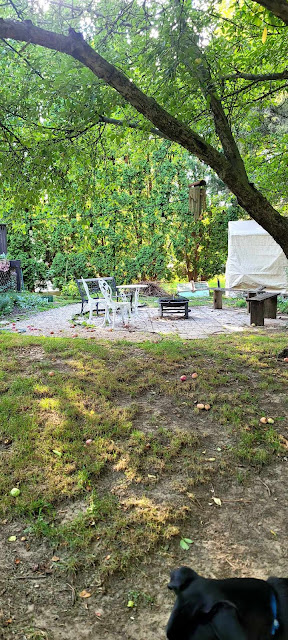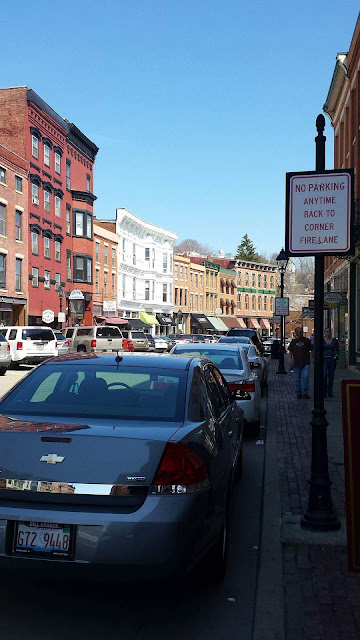Gardens and Yards...
Gardening came to me, unexpected and unbidden, floating in slightly on the gently warming breeze of an American Mid-Western spring. I had always loved gardens in some way or another as, I suspect, nearly all the British do somewhere deep down. Back home, this is evident all over the country, in any possible place you can think to look. Yes, there are stately homes with formal grounds and allotments and back gardens galore but even in the depths of the sprawling urban masses of cities like London or Manchester, we are surrounded by ordinary people’s attempts to bring some greenery into the landscape.
A truism that is oft quoted is that “an Englishman’s home is his castle” and that there is something in the way that an Englishman (or woman for that matter) treats their domicile that is wholly unique. I say, wholly unique, for I fancy that it is an observation that doesn’t just count for Englishmen, but all who hail from the British Isles, in some small way.
Our homes are fortresses, bastions against the endless encroaching waves of modern society and its pits and troughs. We are, at heart, a nation of eccentrics and, it has to be acknowledged, pleasantly happy to be so. We are not particularly concerned, in many cases, with what the world may think of us. So long as we can just close our doors at the end of the day and leave the rest of the world in a heap on our doorstep.
Now that isn’t to say that we can’t and don’t put on masks and fronts when we leave our homes in the morning, of course we do. It is true, however that if there is a space for our eccentricities and oddities to be expressed away from prying eyes, then we are very often content with our lot in life.
The British garden is, in some way, an extension of that idea. If the house is a fortress, then the garden functions as its moat, if the house is a stately home then the gardens function as its grounds. Since our ancestors first created the great earthworks of ancient hill forts and barrows we have always appreciated the allure of a good defensive ditch.
The Americans don’t think of this in the same way, at least, not in my experience. The deep British need to have our own delineated and protected space; a desire driven, I suspect, by the relative population density of our small islands, is one that the Americans don’t appear to share. It seems to me, that for many Americans, their lives are taken up with trying to be more open, to have less barriers, less privacy, somehow. Their homes often feel like tools, functional items, places to sleep, eat and make plans for the day, not the cluttered, yet cosy, sanctuaries of their strange and weirdly accented British cousins.
I relate this to you, dear readers, as merely introduction. It is simply a prelude or a preamble to try to explain how I never felt much need to garden in my own country, yet now am driven (to misquote Quantum Leap), “by some unstoppable force to change my garden for the better”.
I feel lost somehow, an exile, far from my own land. I am unanchored, no longer connected to the ground which had brought forth my people, tossed like a boat on worsening seas. That doesn’t mean that I am not happy here or that I have forgotten that my living here is, in fact, my choice. It was my choice and I would not change it for anything.
Still, I do feel lost, somehow. It can be a strange thing to admit to oneself, that despite living here in the United States for nearly nine years, I still feel very far from home. It doesn’t matter that I speak the same language (although some would say I don’t), have grown up watching American television shows and movies (I know who shot J.R. in Dallas after all), and arguably know the Bill of Rights better than many who were born here.
I am not an American, not down in my heart. My subtext is different, my cultural touchstones not the same. My humour can seem harsh and negative, the British need to rant and complain about things that we are only mildly irritated about comes across as genuine anger, rather than a jocular attempt to process the craziness of the world.
I miss the sea. I miss calling it “the sea” and not “the ocean”. I miss fish and chip shops, waiting in line with the smell of the fryers filling the room while the rain never seems to stop outside. I miss children in school uniforms and blazers trudging their way to schools. I didn’t frequent pubs at home much, but I miss them too. Especially the older rural ones, with horse brasses and farm implements hung on the walls and warm fireplaces blazing in the corner.
Some days it can be hard because it can feel that every day serves to bring some way to reinforce just how far-away I am from where I began. It also reminds me that as I can’t change my own history and cultural background, I can’t change that of anyone else. I can bring something British to the Mid-West though.
I can make a British style garden. A space that isn’t solely for me but that reminds me of home. That there is a place where people can rest and enjoy the flowers in somewhat private surroundings. For, just as they differ from the British in so many ways, the Americans differ in the way they garden (not that they call it a garden, that just means vegetables, they call it a yard).
The Mid-Western garden often ends up being planted, in my experience, in one of two predominant ways. One technique employed is to plant a bunch of evergreens like juniper, shade loving plants like hostas and cover everything in huge piles of impermeable mulch so no weeds are ever to be seen and very little watering has to take place. The other technique is what is known in garden design as “prairie style” planting, this uses native plants like Coneflowers (Echinacea), Black Eyed Susans (Rudbeckia) and things like Goldenrod in big drifts of planting that again have huge amounts of mulch thrown upon it so again there are few weeds and limited watering.
I generalise, of course, but the Mid-Western approach to gardening appears to be based on a need for conformity, “curb appeal” and low maintenance. There is a desire it seems for a garden you plant once, at the beginning of the season and then forget about. The only gardeners who approach this differently are vegetable gardeners who essentially create mini allotments somewhere on their property and very rarely seem to bother about flowers at all.
I love, and miss, the English country garden, the window boxes of the urban high rises. When we drive through small Wisconsin villages, I find myself longing for dry stone walls and impossibly full and bursting cottage gardens, all wisteria climbing up the walls and roses in every corner.
I like gardening. Gardening that I have to come back to, progress that I can track, the passing of the seasons. Seed trays and starter mix inside while there’s still snow on the ground outside; a table and chairs under the shade of our apple tree out on the patio.
I don’t exactly like weeding, but I appreciate that its necessity means that I must be doing something right. I enjoy trimming trees with a hand saw not a chain saw and pruning bushes with a pair of secateurs not a hedge trimmer, because it's not about how quickly I can get things done. I love that much of my garden isn’t productive past flowers that are ephemeral in nature and a general feeling of well-being that it gives me.
I love that gardening connects me to my mother and father, my grandparents and my whole nation. Somehow, gardening makes me able to square the circle of living as something of an exile, I can garden like an Englishman would garden and create a sanctuary in a Mid-western neighbourhood on the East-side of Madison, Wisconsin.
I call it Heritage Hollow, because everyone knows that any self-respecting British house and garden needs a name and not just a number. Going forward I’m going to try to write about how well I’m succeeding and how I’m failing in this endeavour. I hope you’ll do bless with reading my humble scratchings.







Comments
Post a Comment